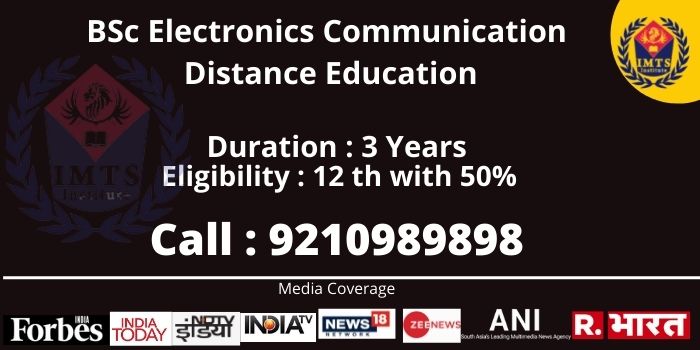BSc Electronics & Communication Distance Education Admission?: Distance BSc in Electronics Communication empowers individuals to achieve their academic goals in the field of electronics & while managing their personal and professional commitments. The average tuition fee for this program is between INR 30,000 to INR 42,000 per year. The eligibility is passing 12th class education with 50% marks. The popular institutes for this program are IMTS Institute and SKU University. Admission deadlines for the BSc EC program is 30 June 2024The curriculum of distance BSc EC covers various topics, including Electronic Devices, Circuits, Digital Electronics, etc., within 3 years.
The jobs offered after completing this UG program are Electronics Engineer, Telecommunication Engineer, and Network Engineer. The starting average salary for such graduates ranges between INR 3 and 9 LPA. This BSc program through DL mode is approved by DEB and UGC.
BSc Electronics & Communication Admission Quick Updates
- IMTS Institute has started admission for the BSc Electronics and Communication program through regular mode with an approx fee of INR 30,500 per year and subjects like Electricity and Basic Electronics, Communication electronics, Physics of materials. The Application deadline is 30 June 2024. Get Application form – https://imtsinstitute.com/
- William Carey University is accepting applications for the BSc Electronics and Communication program with an approx fee of INR 23,600 per annum and subjects like Numerical methods, Microprocessor, Amplifiers, and Oscillators. The last date to apply is 30 June 2024. Visit –https://williamcareyuniversity.ac.in/
Important Points:
- Eligibility: To get admission to a 3 year BSc in Electronics Communication students need to pass a 10+2 examination in science stream with a minimum of 50% marks.
- Duration: The duration to complete the program is 3 years. Students have to appear in semester based examinations.
- Application Deadline: Students who wish to get allotted in this course should submit the application form before 30 June 2024.
- How to Apply: To enroll in this course students need to go through the basic eligibility criteria. Students can submit the application form by visiting the official portal @imtsinstitute.com.
- Curriculum: Students will study about the Basics of Electronics, Fundamentals of Analogue and Digital Systems, Electronic Devices, Semiconductor Devices and many others.
- Study Materials: IMTS Institute provides study material both in online and offline mode to the students who have enrolled for this course.
- Career Opportunities: Electronics engineer, Service Engineer, Desktop Support Engineer, Telecommunications engineering these are some of the job roles offered to the graduates after the completion of the course.
BSc Electronics & Communication Distance Education Highlights
| Course Name | BSc in Electronics and Communication |
| Eligibility | 12th with 45-50% |
| Duration | 3 Years |
| Admission Process | Online / Offline |
| Fee Structure | INR 30,000 – INR 42,000* / Year |
| Level | Bachelors Degree |
| Type | Online/Distance |
| Offered By | IMTS Institute |
What is Distance BSc in Electronics Communication?
Distance BSc in Electronics Communication equips students with the knowledge and skills to design, develop, and maintain electronic systems used in communication technologies. Its curriculum remains similar to the regular program. IMTS Institute and SKU University are also offering this program based on merit. No entrance exam is conducted for selection.
Why Study
- Reduced Cost: Tuition fees for distance BSc EC programs are generally lower compared to regular programs.
- Career Advancement: Earning a B.Sc. in Electronics Communication through distance learning can enhance your career prospects and open doors to higher-paying positions.
Is Distance BSc Electronics & Communication Worth it?
BSc Program in Electronics and Communication via Distance education mode is worth it if you gain fluent skills during the study of this course.
- Skills: Through this UG distance course, you will learn skills in electronics, computer networking, programming skills, research, logical, oral, and digital communication skills.
- Time Flexibility: This distance learning program’s flexibility primarily benefits students who must schedule their studies around ongoing work obligations or those who reside far from [the college].
- Fee and Cost: This course costs low as compared to regular BSc in EC. The tuition fee for this distance BSc average starts from INR 30,000 – INR 42,000* per annum.
- Earn While You Learn: This distance course gives you an opportunity to choose your favourite time of study. So due to this opportunity, you can do a job (part/full) to earn some money.
BSc Electronics & Communication Distance Education Admission 2024
The process of admission to the BSc Electronics distance education programme has begun at IMTS Institute for session 2024-25. A merit score will be used for admission to the Distance BSc Electronics & Communication program. It is required that students have a 12th-grade degree and a 50% score through a recognized university in order to be eligible for this BSc Specialization.
In addition to the application form, students are also required to pay the registration fee on the university website. Learn about integrated circuits, diodes, transistors, vacuum tubes, and other electrical circuits in this course.
In distance mode, admission to this UG degree will be based on merit or previous educational marks. Students do not need to appear in any entrance exam. The admission process can be completed online and students can secure their admission without visiting the institute in person.
BSc Electronics & Communication Distance Education Eligibility Criteria
The eligibility criteria for admission are given below.
- A student must have a certification of 12th-level education from any recognized board in India.
- In the 12th class, they should obtain 45% to 50% marks.
- Physics, Chemistry, and Maths must be major subjects.
- A 5% mark relaxation will be provided to the reserved category students.
BSc Electronics & Communication Distance Education Fee
The fee structure for distance programs is low in comparison to regular ones. The fee is affordable for the BSc Electronics and Communication program. The average fee structure ranges between INR 30,000 to INR 42,000* per annum for 3 years. The fee structure may change as well. Students can pay the fee in installments.
Key features of BSc Electronics & Communication Distance Education
- BSc Electronics & Communication distance education is a 3-year course and is split into six semesters.
- It is a field of science and technology that studies the controlled movement of electrons through varied media and vacuum.
- The fundamental eligibility for admission to the course is 10+2 with science stream and Physics, Chemistry, and maths as core subjects.
BSc Electronics & Communication DDE After Diploma
Undergraduates can pursue the BSc Electronics and Communication distance learning program. Alternatively, a diploma can be obtained in the same field. A diploma in electronics is only available to students who have completed 12th grade. BSc students can apply in 1st year or get lateral entry (2nd year) after completing the diploma.
BSc Electronics & Communication Distance Education Syllabus
| Electricity and Basic Electronics | Communication electronics |
| Physics of materials | Data processing and personal computers |
| Numerical methods | Microprocessor-II |
| Amplifiers and Oscillators | Television and engineering |
| Basic physics-1 | Optoelectronics |
| Semiconductor devices and integrated circuits | Some application-oriented subjects are: |
| Programming in ‘C’ | Medical electronics |
| Digital Electronics | Industrial electronics |
| Basic Physics-II | Power electronics |
| Microprocessor-I | Computer networks |
| Antennas and wave propagation | Electrical and electronic instrumentation |
BSc Electronics & Communication Distance Education in India
BSc Electronics & Communication in distance learning mode is approved by UGC DEB. Many Universities and Institutes offer BSc Electronics & Communication distance learning course in India. IMTS Institute is a reputed institute that provides admission to distance BSc Electronics & Communication in India. BSc is a popular course which is a duration of 03 years. Students should have an eligibility of 10+2 with 45%-50% marks with PCM as the main subject.
Candidates can apply from several areas such as Tamil Nadu, Kerala, Bangalore, Coimbatore, etc at IMTS Institute. By completing the course, students are able to get a job in the private sector. BSc Admission is based on the Merit score.
BSc Electronics & Communication Distance Education Employment Areas
- IT Companies
- Self-run Electronic Shops
- Colleges & Universities
- Electricity Boards
- Banks (technical area)
BSc Electronics & Communication Distance Education Scope
There is a broad scope after the distance BSc Electronics & Communication program. After completing this course, candidates can pursue an MSc in Electronics and a PhD also. They also have the option of taking up a job after completing their bachelor’s. The jobs include Project Manager, Electronics Technician, Sound Technician, etc. More jobs are given below:
BSc Electronics & Communication Distance Education Job Types
| Broadcast and Sound Technician | Radio Journalist |
| Communication Operator | Teacher/Tutor |
| Television Production Manager | Electrical/Electronic Executive |
| Audiovisual Production Specialist | Communication System Operator |
Broadcast and Sound Technician
Typically employed in television and media industries, broadcast and sound technicians are responsible for managing the setup of sound and video broadcasts. They also maintain and operate the electrical equipment used in the industry. The salary of a broadcast and sound technician can range from Rs. 3 L to 9 L per annum. With sufficient experience in the field, these professionals may have the opportunity to work overseas.
BSc Electronics & Communication Distance Education Salary
Graduates with a BSc in Electronics & Communication Distance Education will get an average salary of around INR 3-9 Lakhs per annum. The salary depends on their experience, skills, and company. Degree holders of BSc Electronics & Communication Distance Education can work in electronics & communication industries in the position of Network Engineer, Maintenance Engineer, Telecom Officer, and Service Engineer.
BSc Electronics & Communication Distance Education FAQs
Yes, Bachelor of Science in (Electronics & Communication) is allowed in the private and government sectors.
Yes, B.Sc. is acceptable for the job and other PG degrees.
Yes, many degrees are available after B.Sc. (Electronics & Communication) in Distance Education.
The mode may changeable depending on the institution’s rules.






